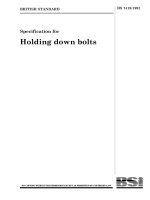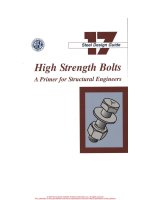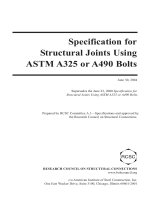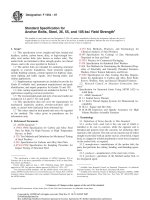High-Strength Bolts
Bạn đang xem bản rút gọn của tài liệu. Xem và tải ngay bản đầy đủ của tài liệu tại đây (716.52 KB, 17 trang )
1
High
High
-
-
Strength Bolts: The Basics
Strength Bolts: The Basics
•
•
Fundamentals and Behavior
Fundamentals and Behavior
•
AISC Specification Requirements
AISC Specification Requirements
Role of the Structural
Role of the Structural
Engineer
Engineer
…
…
•
•
Selection of suitable bolt
Selection of suitable bolt
types and grades
types and grades
•
•
Design of the fasteners
Design of the fasteners
•
•
Responsibility for installation
Responsibility for installation
•
•
Responsibility for inspection
Responsibility for inspection
ASTM A307 Bolts
ASTM A307 Bolts
•
•
often a good choice when loads are
often a good choice when loads are
static
static
•
•
strength level inferior to high
strength level inferior to high
-
-
strength bolts (
strength bolts (
60
60
ksi
ksi
tensile
tensile
ult
ult
.)
.)
•
•
pretension indeterminate
pretension indeterminate
ASTM A325 Bolts
ASTM A325 Bolts
•
•
Type 1 or Type 3 (weathering steel)
Type 1 or Type 3 (weathering steel)
•
•
ASTM Spec. RCSC Spec.
ASTM Spec. RCSC Spec.
•
•
Minimum tensile strength:
Minimum tensile strength:
120
120
ksi
ksi
•
•
Pretension can be induced if desired
Pretension can be induced if desired
ASTM A490 Bolts
ASTM A490 Bolts
•
•
Types 1 or Type 3 (weathering steel)
Types 1 or Type 3 (weathering steel)
•
•
Minimum tensile strength:
Minimum tensile strength:
150
150
ksi,
ksi,
(maximum 170 ksi)
(maximum 170 ksi)
•
•
ASTM Spec. RCSC Spec.
ASTM Spec. RCSC Spec.
•
•
Pretension can be induced if desired
Pretension can be induced if desired
Comparison of Bolts: Direct Tension
Comparison of Bolts: Direct Tension
7/8 in. dia. A307 bolt
7/8 in. dia. A307 bolt
0.05 0.10
0.15 0.20
20
40
60
80
7/8 in. dia. A490 bolt
7/8 in. dia. A490 bolt
7/8 in. dia. A325 bolt
7/8 in. dia. A325 bolt
elongation (inches)
bolt
tension
kips
2
Comments
Comments
…
…
•
•
Note: we quote the
Note: we quote the
ultimate
ultimate
tensile
tensile
strength of the bolt
strength of the bolt
–
–
this is the benchmark for strength
this is the benchmark for strength
statements (e.g. shear strength is some
statements (e.g. shear strength is some
fraction of ultimate tensile strength)
fraction of ultimate tensile strength)
•
•
What about yield strength?
What about yield strength?
•
•
What is
What is
“
“
proof load
proof load
”
”
…
…
comments cont
comments cont
’
’
d
d
•
•
Nuts: ASTM A563
Nuts: ASTM A563
•
•
Washers: if needed, ASTM F436
Washers: if needed, ASTM F436
•
•
Bolt
Bolt
–
–
nut
nut
–
–
washer sets implied so
washer sets implied so
far, but other configurations
far, but other configurations
available
available
Loading of Bolts
Loading of Bolts
•
•
Shear
Shear
–
–
load transfer by shear in bolt
load transfer by shear in bolt
and
and
bearing in connected material
bearing in connected material
OR
OR
–
–
load transfer by friction (followed by
load transfer by friction (followed by
shear and bearing)
shear and bearing)
•
•
Tension
Tension
•
•
Combined Tension and Shear
Combined Tension and Shear
Shear Loading cont
Shear Loading cont
’
’
d
d
Truss Joint
Truss Joint
Bolts Loaded in Tension
Bolts Loaded in Tension
bolts in
shear
bolts in tension
bolts in tension
Bolts in Tension
Bolts in Tension
–
–
prying
prying
High
High
-
-
strength bolts in tension can
strength bolts in tension can
be a source of problems!
be a source of problems!
B
o
l
t
f
o
r
c
e
B
o
l
t
f
o
r
c
e
Prying force
Prying force
A
p
p
l
i
e
d
f
o
r
c
e
A
p
p
l
i
e
d
f
o
r
c
e
3
Bolts in combined tension and shear
Bolts in combined tension and shear
bolts in
bolts in
combined
combined
shear and
shear and
tension
tension
bolts in shear
bolts in shear
Consider a simple joint
Consider a simple joint
—
—
P
P
P
P
P
P
P
P
a bearing force
a bearing force
{
{
P
P
P
P
and associated
and associated
shear stress
shear stress
{
A
A
P
P
=
=
τ
τ
Free body
Free body
of bolt
of bolt
Finally...
Finally...
opposite to the bearing force shown
opposite to the bearing force shown
previously
previously
note that this force is equal and
note that this force is equal and
P/2
P/2
P/2
P/2
P
P
t
t
d
d
In the example, we identified
In the example, we identified
…
…
•
•
the force in the bolt (a shear force)
the force in the bolt (a shear force)
•
•
the force that the bolt imposed on the
the force that the bolt imposed on the
plate (a bearing force)
plate (a bearing force)
•
•
the force in the plate itself (a tensile force)
the force in the plate itself (a tensile force)
•
•
force transfer could also be by
force transfer could also be by
friction
friction
:
:
not included in this illustration
not included in this illustration
AISC Standard 2005
AISC Standard 2005
•
Parallel LRFD and ASD rules
•
LRFD uses a resistance factor, Ø
•
ASD uses a safety factor, Ω
•
Loads as appropriate:
– factored loads for LRFD
– non-factored loads for ASD
4
AISC Standard cont
AISC Standard cont
’
’
d
d
LRFD: req’d strength LRFD ≤
φ
R
n
ASD: req’d strength ASD ≤ R
n
/ Ω
(
Better to write it as resistance ≥ req’d strength?
)
i.e. φ R
n
≥ req’d strength
Installation
Installation
—
—
•
•
Snug
Snug
-
-
tight only
tight only
•
•
Pretensioned
Pretensioned
–
–
Calibrated wrench
Calibrated wrench
–
–
Turn
Turn
-
-
of
of
-
-
nut
nut
–
–
Other means:
Other means:
9
9
Tension control bolts
Tension control bolts
9
9
Load
Load
-
-
indicator washers
indicator washers
deformation over
deformation over α
,
mm
average
average
bolt
bolt
shear
shear
MPa
Behavior of a large joint (shear splice)
Behavior of a large joint (shear splice)
—
—
Bolts in Shear: Issues
Bolts in Shear: Issues
•
•
Shear strength of bolt (single shear
Shear strength of bolt (single shear
or double shear, threads in shear
or double shear, threads in shear
plane?)
plane?)
•
•
Bearing capacity of bolt (never
Bearing capacity of bolt (never
governs)
governs)
•
•
Bearing capacity of plate
Bearing capacity of plate
•
•
Tensile capacity of plate
Tensile capacity of plate
Slip in bolted joints
Slip in bolted joints
…
…
•
•
Can be as much as two hole
Can be as much as two hole
clearances
clearances
•
•
In a joint with a reasonable number
In a joint with a reasonable number
of bolts, some will already be in
of bolts, some will already be in
bearing at start of loading
bearing at start of loading
•
•
Both laboratory tests and field
Both laboratory tests and field
measurements indicate that slip is
measurements indicate that slip is
more like
more like
1/2
1/2
hole clearance
hole clearance
Bolts in shear
Bolts in shear
-
-
type connection:
type connection:
•
•
Common type of joint
Common type of joint
•
•
Specifications distinguish between
Specifications distinguish between
:
:
–
–
bearing type connections
bearing type connections
–
–
slip
slip
-
-
critical connections
critical connections
–
–
Note: a slip
Note: a slip
-
-
critical joint (service loads)
critical joint (service loads)
must also
must also
be checked as a bearing
be checked as a bearing
joint (factored loads)
joint (factored loads)
5
Bearing
Bearing
-
-
type connections:
type connections:
•
•
Issues
Issues
–
–
bolt shear strength
bolt shear strength
–
–
bearing capacity connected material
bearing capacity connected material
–
–
member strength
member strength
•
•
Shear strength of bolts is
Shear strength of bolts is
not dependent
not dependent
on presence or absence of pretension
on presence or absence of pretension.
(How come?)
(How come?)
Bolts in bearing
Bolts in bearing
-
-
type connections
type connections
…
…
load
load
deformation
deformation
Region of bearing
Region of bearing
-
-
type behavior
type behavior
Bolt Shear Strength
Bolt Shear Strength
•
•
Bolt shear strength
Bolt shear strength
≈
≈
62% of bolt ultimate
62% of bolt ultimate
tensile strength (
tensile strength (
tests
tests
)
)
–
–
Design rule takes 80% of this value
Design rule takes 80% of this value
–
–
Threads in shear plane?
Threads in shear plane?
–
–
Long joint effect: another discount
Long joint effect: another discount
applied.
applied.
Individual bolt in shear
Individual bolt in shear
Physical test
Physical test
—
—
Uneven loading
Uneven loading
of bolts
of bolts
–
–
(End four bolts of 13)
(End four bolts of 13)
6
Bolts are loaded (in shear) as a
Bolts are loaded (in shear) as a
consequence of the differential
consequence of the differential
strains between the plates
strains between the plates
…
…
high
high
strain
strain
= high differential strain
= high differential strain
low
low
strain
strain
Bolt Pretension v. Shear
Bolt Pretension v. Shear
•
The bolt pretension is attained as a result of small
axial elongations introduced as nut is turned on
•
These small elongations are relieved as shear
deformations and shear yielding take place
•
Confirmed by both bolt tension measurements
and shear strength tests
•
So, bolt shear strength NOT dependent on
pretension in the bolt.
Back to bolt in shear
Back to bolt in shear
—
—
Shear strength
of single bolt
(tests) —
boltu
62.0 σ=τ
Shear deformation
Bolts in Shear
Bolts in Shear
—
—
AISC
AISC
bvn
AFR φ=φ
strengthsheardesignR
n
=φ
ksi strength,shear nominalF
v
=
nominal shear strength
nominal shear strength
…
…
uuv
F50.0)F (0.62 %80F
75.0
=×=
=
φ
—
—
these are the values given in
these are the values given in
Table J3.2 of the Specification for
Table J3.2 of the Specification for
the thread
the thread
excluded
excluded
case. For
case. For
threads
threads
included
included
, the tabulated
, the tabulated
values are 80% of the above
values are 80% of the above
.
.
ksi75ksi15050.0F:bolts490A
ksi60ksi12050.0F :bolts 325A
v
v
=×=
=×=
Thus
Thus
…
…









